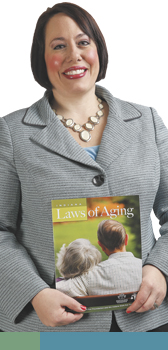Subscriber Benefit
As a subscriber you can listen to articles at work, in the car, or while you work out. Subscribe Now (IBJ Photo/Aaron P. Bernstein)
(IBJ Photo/Aaron P. Bernstein)Why she practices law: A third-generation attorney, Rebecca Geyer was interested in working with families, “but,” she said, “not traditional family law, like divorce.” Memories of her grandparents weakening and her parents having to take care of them—“I still remember them having to take away my grandfather’s keys”—planted the seed for what would becoming a thriving practice focused on elder law.
Lessons from Dad: “Dad would talk to clients and dictate letters from home and so I grew up around the law. In my mind, a lawyer was someone who helped people.” Law-school selection wasn’t an issue. “I come from a proud group of IU fans,” she said. (She boasts of seeing games at every Big Ten school sans Nebraska and Penn State.)
Hanging a shingle: After 14 years with other firms, Geyer opened her own in 2013. Surprises? Not really. “I’m always someone who likes to know as much as possible about a job, whether managerial or administrative. You never know when you are the one who has to make copies or answer the phone.”
Family: husband, Paul; sons Nathan, 11, Sam, 8, and Charlie, 6
Give-backs: Geyer served as treasurer of the Indianapolis Bar Foundation, serves on the board of the Elder Law Section of the Indiana State Bar Association and the Carmel-Clay Historical Society, is vice president of Congregation Beth-El Zedeck, and chairs the Task Force for Unemployed and Underemployed Lawyers. And she’s a past president of the National Council of Jewish Women. “As you can imagine,” she said, “I have a problem saying no.”
Advice to other Forty Under 40s: “Be organized so that, if something happens, the people you leave behind know that everything—legal documents, bank and insurance information, etc.—is in one place.” She would also suggest having that conversation with parents, even if they are in good health. “In a crisis mode, it’s easier to know how to react if everything is easy to find—including a list of doctors, specialists and medications.”•
Please enable JavaScript to view this content.
